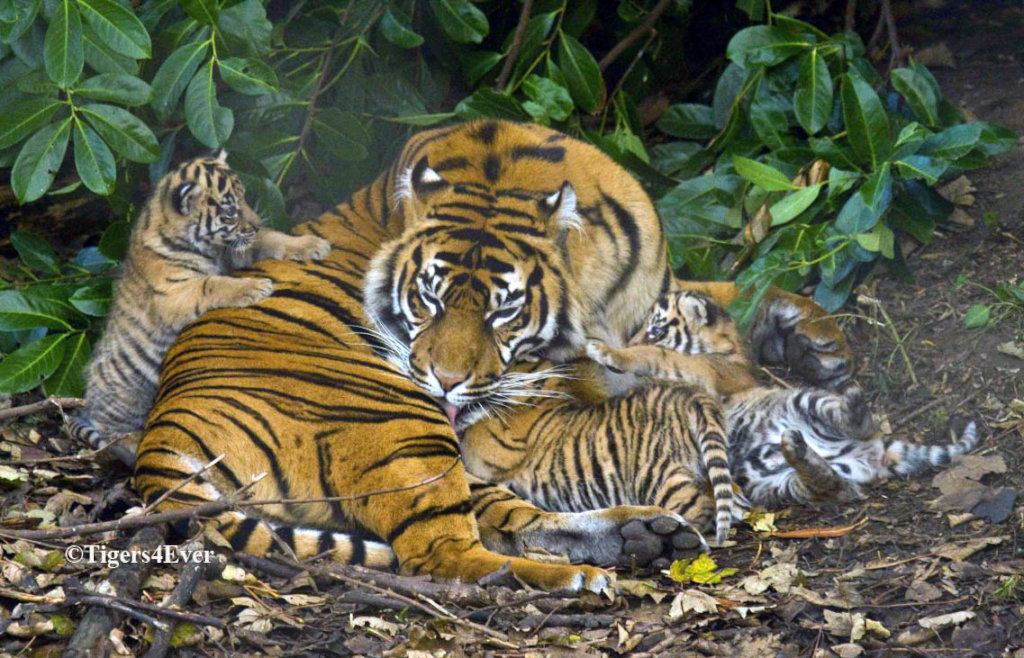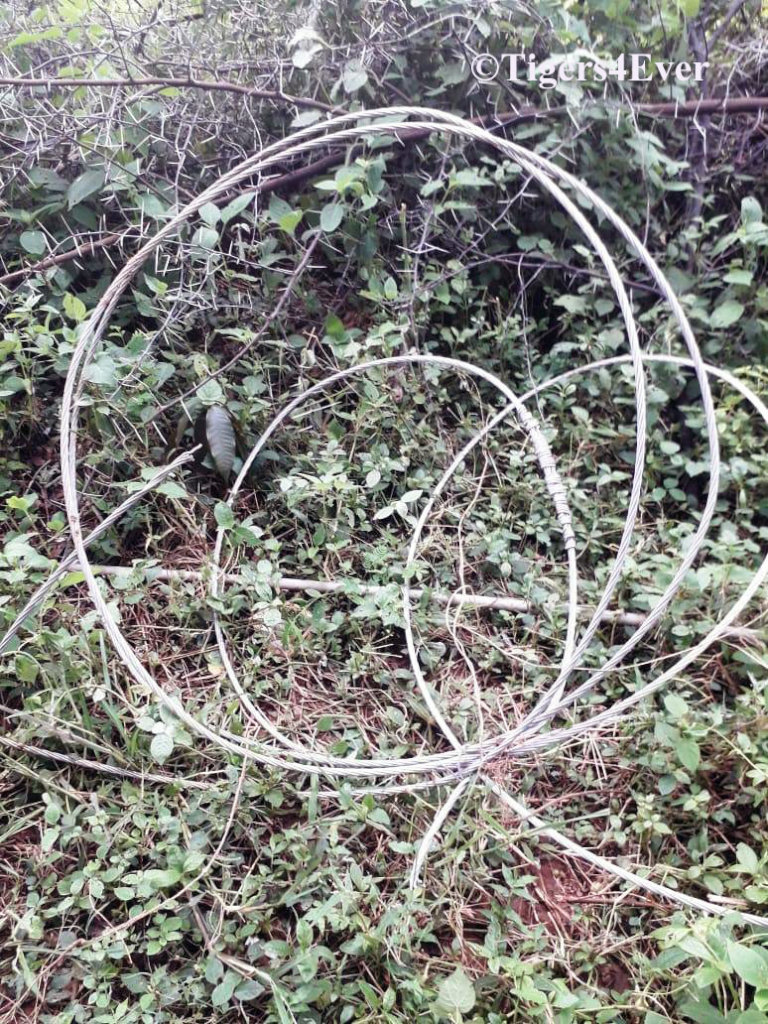By Dr Corinne Taylor-Smith | Project Leader
Your amazing support over the last 18 months has meant that we’ve been able to increase our patrolling to three times normal levels during the monsoon peak poaching season this year. Your support throughout these challenging times has ensured that we can protect an extra 1000km (624 miles) per month of wild tiger territory over and above what was possible in June 2020, so thank you on behalf of the wild tigers we’re keeping safe.
Monsoon Challenges
Each year, the monsoon season brings a set of very different challenges for our anti-poaching patrollers, not just from the increased threat of wildlife poaching but from the weather itself. It is not uncommon for a sudden thunderstorm to knock out the power supplies for days, or lightning to strike down trees which have stood tall, up to 35 metres, (115 feet) and intact for hundreds of years; or rain to turn dry river beds into torrential currents in a matter of moments. Suddenly, the monsoon rains can wash away all matter of sins as human trails are washed from sight. Foot patrolling is hazardous too as snakes and lizards become more aggressive during the monsoon too. Each year, more than a hundred people are bitten by snakes with around 12-15% of these bites proving fatal. Suddenly, it’s not just wire snares and jaw traps which our patrollers need to be extra careful where they put their feet to avoid, it’s cobras, kraits, vipers and monitor lizards too. It is at times like this when we really admire the bravery and skill of our anti-poaching patrols.
The Roads and Tracks are Tricky Too
In a matter of moments, a dry track, trail or road can be overwhelmed by flash flooding, during the monsoon. Patrollers can go from following tracks to wading knee deep in water in a matter of minutes. It is why we always keep an all-wheel drive patrol vehicle at an agreed meet-point should ground conditions render foot patrolling impossible. Even with the most skilled drivers, the flash flooding can cause the patrol vehicles to fishtail too. Our patrollers carry on, determined to keep wild tigers safe, despite the challenging conditions which make their work so much more difficult. One of the biggest challenges of the weather is it slows everything down, foot patrolling is harder, it takes longer than in the dry. Driving is harder, slower and takes a greater toll on both the vehicle and its fuel efficiency too. That’s why we need to do more patrolling cycles to cover the same distances plus extra patrolling to cover those high risk areas where miscreant tracks get washed away.
The Monsoon was Early
This year the monsoon rains arrived 6 weeks earlier than normal, which was quite a surprise, what we don’t know for sure is whether this will also signal and early end to the rains too. The unseasonal rains played havoc with the crop growing in the villages around Bandhavgarh too; so time will tell whether this will also affect crop yields and ultimately increase human-wildlife conflict. Right now our patrollers are dealing with the challenges of rains which come, cause flash flooding and go, with thunderstorms which wreak havoc even without heavy rainfall because of lightning strikes on trees, etc. Thankfully, our patrollers are well prepared for the challenges the monsoon brings and were equally adaptable to the extra shifts needed to take our patrolling to triple normal levels to minimise the increased risk. The early monsoon may be a sign of seasonal changes due to climate change, or may be an isolated event given that it followed two cyclones in Tauktae and Yaas, again only time will tell. In the meantime we will try to adapt our patrolling around these weather changes and the different challenges and risks each brings.
Poachers Strike Again
With very heavy hearts, we have to report that, despite our increased patrolling efforts, just last weekend the poachers struck again killing one of Bandhavgarh’s most famous tigers the Banvai female. In a brutal case, this beautiful tigress was strangled by a cable around her neck and her body was thrown into an open well. It’s not certain at this stage as the poachers are still at large, whether they threw the tiger into the well to hide their ill deed as they were disturbed before they could harvest what they needed, or whether they killed the tigress as a revenge attack or unintentional target. What we do know is that a precious wild tiger has been lost, the fate of her latest litter is uncertain and the criminals responsible are yet to be caught. We are still fighting hard to improve on our 97.5% reduction in wild tiger deaths due to poaching and poisoning, but incidents like this one remind us that there is still a lot more to be done before we can eliminate these threats completely.
Poachers Still at Large
Extra vigilance is now needed to ensure that further tigers aren’t targeted before these poachers are caught. We will keep our patrols tripled until the end of this month and will assess the risk levels as we enter October, when we currently plan to revert to 2.5 times standard patrolling , however, if the poachers of the Banvai tigress remain at large we may need to keep patrolling at the monsoon triple patrolling levels. If this is the case, we’ll need to raise an extra £260 (US$365) for each month we need to sustain this unseasonal increase. Next week (13-17 September 2021), it is the GlobalGiving Little By Little matched funding campaign when your donations up to £38 (US$50) will receive bonus matched funds at 50% of your donation, making this a great time to help us protect these wild tigers (https://goto.gg/28767).
Little by Little
Tigers4Ever is taking part in the GlobalGiving Little By Little campaign to ensure that we can sustain our increased patrolling as long as these increased threats remain. So if you can help with a small donation up to £38 (US$50) during next week, then your impact will be 1.5 times greater for the wild tigers. If you can afford to donate more, of course this will be most welcome too; and the good news is that your donation will get the matched bonus funds on the first £38 (US$50) too (https://goto.gg/28767).
Despite the current climate in India, poachers are still active so our patrollers need to be equally active too, if we are to keep the wild tigers and their cubs safe. To ensure that we can undertake our planned increased patrolling until the end of this year, we need to raise a total of £3960 (US$5620) so we can keep this going (https://goto.gg/28767). Despite a slowdown in the new infections from the current wave of COVID19 in India, we know that the economic impact on the wider tiger community is high and so our patrolling will still need to be increased for quite some time too.
As always, our anti-poaching patrols are working flat out to mitigate the risks caused by increased human encroachment levels and the in poaching activity in the neighbouring states and Madhya Pradesh. We don’t always get it right as the recent poaching incident has shown, but we always try to do more and better when the worst happens, so we hope we can rely on your continued loyal support. The only way we can address the increased threat of poaching and retaliatory poisoning is to keep our patrolling at the highest possible levels (2.5 times or triple patrolling) until at least the end of December 2021, when hopefully the continued COVID vaccination rollout will help to alleviate the economic burden of COVID19, and hopefully the children of the villages will be able to return to school for the first time in over 18 months.
Making a Difference
Right now, thanks to your continued support and with triple patrols, we’re covering an extra 1000km (624 miles) per month of wild tiger territory over and above the 1.5 times patrolling we were doing in June 2020. The increase also we can spend more time looking for snares; traps and signs of would be poisoners around forest areas where human encroachment is rife. Increased patrols also help to curb the dangerous encroachment into the territories of wild tigers which is still increasing, and to provide safety advice for those trying to protect their crops and livestock from wandering elephants and tigers respectively.
It isn’t all bad news though, with 42 new tiger cubs born since April 2020, we have a lot of wild tigers to keep safe. To sustain the increase in our patrolling, we need to ask for your help. Your gift today can make a huge difference as to whether Bandhavgarh’s wild tigers can survive these unprecedented threats:
If we don’t act now, we are sure that the lives of more tigers and more humans will be lost, and with every loss of human life comes another threat to the tiger’s survival in the wild, thus we must protect both if we are to ensure that wild tigers will have a wild future.
Every single donation received will help us to save wild tigers’ lives, no matter how large or small. The current crisis means that we need your help like never before: https://goto.gg/28767.
Please don’t hesitate if you can help, your donation can be the difference between life and death for a wild tiger, as it helps to increase our patrolling when it is most needed. Every tiger and every tiger cub counts. Thank you for making our fight against poachers, the changing climate and human-animal conflict possible.
Links:
Project reports on GlobalGiving are posted directly to globalgiving.org by Project Leaders as they are completed, generally every 3-4 months. To protect the integrity of these documents, GlobalGiving does not alter them; therefore you may find some language or formatting issues.
If you donate to this project or have donated to this project, you can receive an email when this project posts a report. You can also subscribe for reports without donating.
Support this important cause by creating a personalized fundraising page.
Start a Fundraiser
